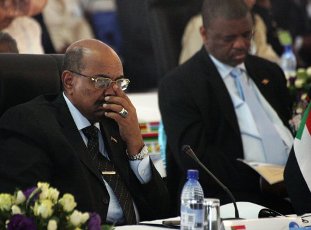ICC judges query Malawi on failure to arrest Sudan’s Bashir
19 October 2011 (KHARTOUM) – The judges of the International Criminal Court on Wednesday issued a decision asking Malawi to submit an explanation on why it did not execute an arrest warrant issued for Sudanese president Omer Hassan al-Bashir during his visit last week.

But African Union (AU) members including signatories to the Rome Statute, which is the founding text of the court, have repeatedly pledged in summit resolutions not to comply with the warrants.
So far Kenya, Chad, Djibouti and Malawi are the African ICC members that have allowed Bashir to visit without apprehending him.
The ICC judges have reported Chad, Kenya and Djibouti to the United Nations Security Council (UNSC) and ICC Assembly of State Parties for failing to comply with their obligations under the treaty. However, neither bodies took any actions with respect to the non-compliance.
The UNSC has referred the Darfur case to the ICC under a Chapter VII resolution in 2005 since Sudan is not a state party to the court.
Bashir was among six heads of state at the meeting of the 19-member Common Market for Eastern and Southern Africa (COMESA) and returned home later in the weekend.
Malawi’s foreign minister told Reuters at the time that the country would not arrest Bashir, citing the “brotherly coexistence” between member states of the Common Market for Eastern and Southern Africa, to which it and Sudan belong.
The judges’ decision revealed that the ICC registry sent a note to the embassy of Malawi in Brussels, reminding it of its obligations under the statute. The authorities in Malawi did not respond to the notification.
Pre-Trial Chamber I invited the competent authorities in Malawi to “to submit, no later than Friday, 11 November 2011, any observations on the Report, in particular with regard to the alleged failure by the Republic of Malawi to comply with the Cooperation Requests issued by the Court.”
Malawian President Bingu wa Mutharika has previously said that African leaders should not be dragged to the ICC for offenses committed in Africa.
“Why on earth should your leaders be dragged to the Hague when your judges are right here,” he said.
African judges and the judicial system “would be seen to be admitting failure if they continue to allow its own leaders to appear before an international judiciary for offenses committed on the African continent.”
“We Africans must stand up and be courageous to try our own leaders so that no African should be dragged to court outside our own judiciary system,” he said.
Malawi is the second state after Chad asked by the judges to provide an explanation on breaching its treaty obligations.
Chad said it was complying with AU decision instructing its members not to arrest the Sudanese leader even if they are ICC members.
The US and European nations have issued statements criticizing Malawi for failing to adhere to its legal obligations.
(ST)
